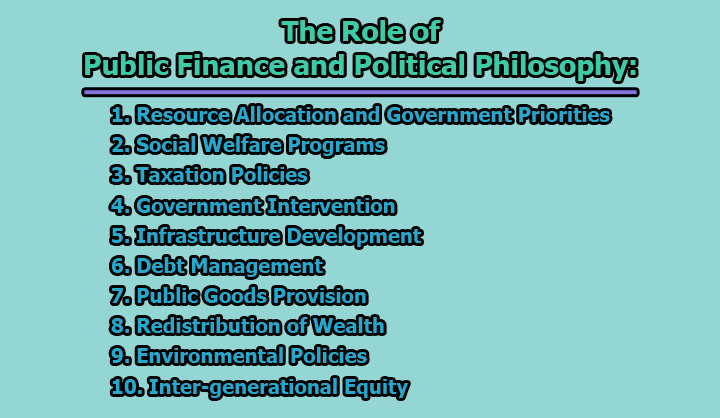The Role of Public Finance and Political Philosophy:
Public finance, the domain where governments manage their fiscal affairs, is intricately entwined with the underlying political philosophies that shape societies. This nexus between public finance and political philosophy plays a pivotal role in determining how a nation allocates resources, establishes priorities, and addresses societal needs. The interplay between economic policies and political ideologies forms the foundation upon which governments build their frameworks for taxation, social welfare, infrastructure development, and more. This synergy is instrumental in shaping the character of a nation’s governance, reflecting its values, priorities, and vision for the future. In this article, we will explore the role of public finance and political philosophy.
1. Resource Allocation and Government Priorities: Public finance is a critical tool for governments to allocate resources and determine priorities in line with their political philosophy. For instance, a government following a social democratic philosophy might prioritize funding for education and healthcare to address social inequalities (Stiglitz, 2012). This aligns with the idea that public spending should enhance societal welfare and reduce disparities.
2. Social Welfare Programs: Political philosophy significantly influences the design and execution of social welfare programs. For instance, a liberal political philosophy might advocate for a comprehensive social safety net to ensure a basic standard of living for all citizens (Rawls, 1971). This reflects the belief that societal prosperity should be shared and that social programs are instrumental in achieving this goal.
3. Taxation Policies: Taxation policies are inherently linked to political philosophy. Progressive taxation, supported by many social democrats, is based on the idea that those who can afford to contribute more should do so to address economic disparities (Piketty, 2014). In contrast, a conservative philosophy might lean towards lower taxes, emphasizing individual responsibility and free-market principles.
4. Government Intervention: Political philosophy guides decisions on the extent of government intervention in the economy. Keynesian economic thought, for example, supports government intervention during economic downturns to stimulate growth (Keynes, 1936). This reflects the belief that the government can play a positive role in stabilizing the economy through strategic interventions.
5. Infrastructure Development: The approach to infrastructure development is influenced by political philosophy. A socialist perspective may favor extensive public ownership and investment in infrastructure to ensure collective benefit (Harvey, 2005). In contrast, a more libertarian philosophy might prioritize private sector involvement, viewing it as more efficient and aligned with free-market principles.
6. Debt Management: Political philosophy influences attitudes toward government debt management. Keynesian economics suggests that deficits can be acceptable during economic downturns to stimulate demand (Krugman, 2013). On the other hand, conservative philosophies often emphasize the importance of fiscal responsibility and reducing government debt to avoid long-term economic risks (Reinhart & Rogoff, 2010).
7. Public Goods Provision: The concept of public goods is central to public finance and varies based on political philosophy. Utilitarian perspectives may emphasize providing goods that maximize overall happiness (Bentham, 1789). Meanwhile, libertarian philosophies might limit government provision to only essential public goods, leaving more to individual choices and markets (Nozick, 1974).
8. Redistribution of Wealth: Public finance plays a pivotal role in wealth redistribution, and political philosophy shapes the approach. Socialists may advocate for progressive taxation and robust social programs to address income inequality (Marx, 1867). Conversely, proponents of laissez-faire capitalism may argue for minimal wealth redistribution to preserve individual incentives (Hayek, 1944).
9. Environmental Policies: Political philosophy influences decisions on environmental policies funded through public finance. Ecocentric philosophies stress environmental sustainability for its intrinsic value (Leopold, 1949). Utilitarian approaches might focus on balancing environmental concerns with economic needs, ensuring the greatest good for the greatest number (Singer, 1972).
10. Inter-generational Equity: Consideration of inter-generational equity in public finance decisions is influenced by political philosophy. Sustainable development, often associated with environmental ethics, aligns with philosophies emphasizing responsibility to future generations (Brundtland, 1987). Conversely, short-term economic interests may take precedence in more immediate-gain-oriented political ideologies.
In conclusion, the intersection of public finance and political philosophy determines how a society allocates resources, addresses social issues, and shapes its economic and political landscape. The balance between public and private sector involvement, the level of taxation, and the prioritization of public goods all reflect the underlying political values and beliefs of a society.
References:
- Bentham, J. (1789). An Introduction to the Principles of Morals and Legislation. Dover Publications.
- Brundtland, G. H. (1987). Our Common Future. Oxford University Press.
- Harvey, D. (2005). A Brief History of Neoliberalism. Oxford University Press.
- Hayek, F. A. (1944). The Road to Serfdom. University of Chicago Press.
- Keynes, J. M. (1936). The General Theory of Employment, Interest, and Money. Palgrave Macmillan.
- Krugman, P. (2013). End This Depression Now! W. W. Norton & Company.
- Leopold, A. (1949). A Sand County Almanac. Oxford University Press.
- Marx, K. (1867). Das Kapital. Progress Publishers.
- Nozick, R. (1974). Anarchy, State, and Utopia. Basic Books.
- Piketty, T. (2014). Capital in the Twenty-First Century. Harvard University Press.
- Rawls, J. (1971). A Theory of Justice. Belknap Press.
- Reinhart, C. M., & Rogoff, K. S. (2010). “Growth in a Time of Debt.” American Economic Review, 100(2), 573–578.
- Singer, P. (1972). “Famine, Affluence, and Morality.” Philosophy & Public Affairs, 1(3), 229–243.
- Stiglitz, J. E. (2012). The Price of Inequality: How Today’s Divided Society Endangers Our Future. W. W. Norton & Company.

Library Lecturer at Nurul Amin Degree College










